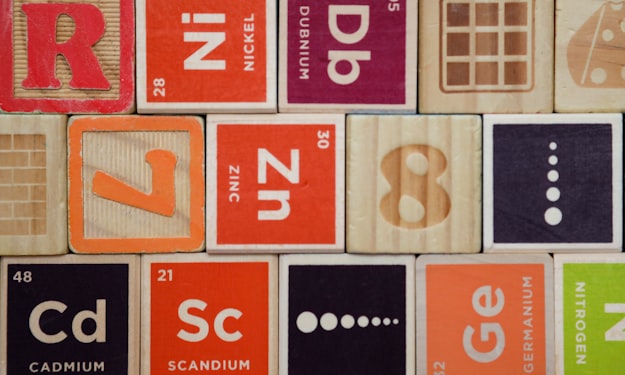astronomy
Celestial objects and the phenomena that surrounds them. What lies above the earth forever out of reach. From moons, to stars, galaxies, and beyond.
Exploring the Elemental Universe: From Hydrogen to Oganesson
British spelling. The five lightest elements in the universe. <><><> 1/5 I’m a Hydrogen Atom (H) With Atomic Number 1 By far, I am the most abundant chemical element in the universe.
A B ForbesPublished about 22 hours ago in Futurism

The Full Pink Moon
In the vast tapestry of the cosmos, where stars twinkle and galaxies dance, there exists a phenomenon that captures the imagination of humanity like few others—the Pink Moon. Shimmering with an ethereal hue, this celestial event transcends mere astronomical significance, weaving a tapestry of folklore, mystique, and wonder that has enraptured civilizations for centuries. As this enchanting lunar spectacle graces the night sky, we embark on a journey to unravel its secrets, exploring the science, myths, and cultural significance that surround the Pink Moon.


The old kingdom Agartha
The old kingdom Agartha Agartha is not a myth or a fantasy but a reality hidden from us for centuries. The theory, known as the Hollow Earth Theory, states that the Earth is not a solid sphere but a hollow one with a vast cavity inside. In this cavity, a small sun illuminates the inner world, creating a lush, livable environment on the flip side of the Earth's surface.
Cosmic SecretsPublished 3 days ago in Futurism

Aestas ¤ The Yellow Balloon
As humanity begins to tame the stars above, at what point do a group of colonists turn into a unique, indigenous people who will band together to protect their homeland... no matter what?
Tales of Space and Life
British spelling. Here are two of them. <><><> 1/2 The remarkable scale of atoms. Atoms are the smallest particles of chemical elements.
A B ForbesPublished 3 days ago in Futurism

The signal from Centauri
The search for extraterrestrial intelligence has been a topic of fascination for humanity for decades. The scientific community has recently been captivated by the mysterious signal from Proxima Centauri, our closest stellar neighbor, detected by the Breakthrough Listen project.
Cosmic SecretsPublished 5 days ago in FuturismExploring The Alien Worlds: A Journey into the Realm of Exoplanets
Introduction Have you ever come across the word “Exoplanets?”. Exoplanets simply means planets that are outside our solar system. A long time ago, people used to live in groups of large numbers of people called villages. They only knew that at night it was dangerous to walk since that was the time their enemies ruled their land. So, they lived under the caves to protect themselves from dangerous animals like lions. As time passed, people became curious about what lies beyond the mountains, hills, and oceans. So, we had explorers. During exploration, all the seven continents were connected. Black people came to learn that there are people like them who exist but are white. Due to increased food shortages, pandemics and struggle for the limited resources, human technology started to enhance leading to industrialization and technology.
Solomon OdipoPublished 7 days ago in FuturismCould the Unthinkable Be True?
British spelling. I write easy-to-understand educational stories about the universe and life. You may find them interesting.
A B ForbesPublished 10 days ago in FuturismThe Gargantuan Place We Call the Universe
I write easy-to-understand stories about the universe and life, here are three of them. Enjoy. British spelling. <><> 1/3
A B ForbesPublished 12 days ago in Futurism

DARK ENERGY VARIATIONS MAY UNLOCK COSMIC MYSTERIES
As the week of the total solar eclipse in this part of the world winds down, I’m reminded of the eerie but sublime darkness and sudden cold we experienced that afternoon.
David Morton RintoulPublished 14 days ago in Futurism

Farewell to the Delta 4 Heavy: A Legacy of Innovation in U.S. Rocketry"
In a poignant moment marking the end of an era in U.S. rocketry, United Launch Alliance (ULA) bid adieu to its venerable Delta 4 Heavy rocket with its 16th and final launch. This historic event, which occurred on Tuesday, saw the rocket lifting off from pad 37 at the Cape Canaveral Space Force Station in Florida, carrying a classified spy satellite into orbit. It signified the closure of a storied lineage that has played a pivotal role in shaping the nation's space endeavors since the dawn of the space age.
Hirusha A. FernandoPublished 16 days ago in Futurism

Into the Abyss
In the depths of the cosmos, where the fabric of space-time twists and bends, lies a phenomenon so enigmatic and mysterious that it defies comprehension: the black hole. Within its dark embrace, the laws of physics break down, and the very essence of reality is warped beyond recognition. Yet, for a group of intrepid explorers aboard the starship Odyssey, the allure of these cosmic behemoths is irresistible.

















